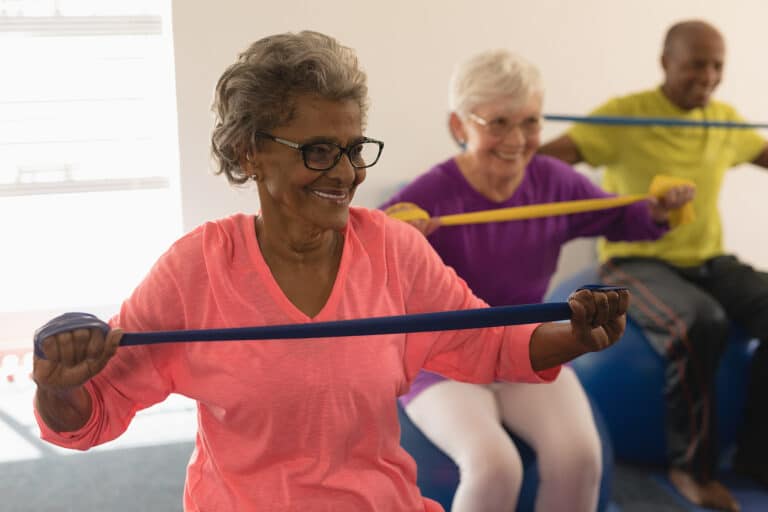It can be a challenging journey to care for someone with Alzheimer’s disease. While no treatment is presently available, following a comprehensive Alzheimer’s care plan that incorporates physical activity can dramatically improve the quality of life for people living with Alzheimer’s. This is especially important for seniors, as exercise can also improve their overall well-being and emotional stability, as well as help them preserve their independence for as long as possible.
The Relationship Between Exercise and Cognitive Health
Numerous studies have linked physical activity and brain health. Regular exercise raises blood flow to the brain, promotes the creation of new neurons, and increases the production of substances that repair and protect brain cells. These advantages can assist seniors with Alzheimer’s by reducing cognitive decline, increasing memory, and improving problem-solving skills.
Exercises that improve cardiovascular health, such as walking, swimming, and cycling, have a strong correlation with brain function. Strength training and balance exercises also help to preserve motor functions, reduce the risk of falls, and promote independence in everyday duties.
Emotional and Behavioral Benefits
Alzheimer’s is both a cognitive and an emotional disease, with symptoms including anxiety, despair, and mood swings. Physical activity produces endorphins, the body’s natural “feel-good” hormones, which can alleviate symptoms of depression and anxiety. Additionally, participating in group exercise activities helps increase seniors’ social connections, which may decrease as the years pass by. Another thing to note is that having a consistent exercise program as part of the Alzheimer’s care plan may decrease issues with agitation, aggression, and restlessness.
Promoting Physical Health and Independence
Physical activity can help with a number of common health conditions that frequently increase Alzheimer’s symptoms. For example, seniors with Alzheimer’s can better manage their weight, lower their blood pressure, and improve their sleep quality by including physical exercise in their daily routine. Plus, improved physical health means fewer medical issues and a higher overall quality of life.
Exercise also enhances functional independence by keeping muscles strong, balanced, and coordinated. This allows seniors with Alzheimer’s to continue performing daily tasks like dressing, bathing, and eating for as long as possible, which not only increases self-esteem but also alleviates the caregiver strain.
Customizing Exercise to Individual Needs
When incorporating exercise into an Alzheimer’s care plan, it’s critical to personalize exercises to the senior’s abilities, interests, and stage of disease. Those in early phases may enjoy walking, dancing, or yoga, while seniors in later stages may benefit from seated exercises or simple stretches. It’s important to remember that safety is the first priority, no matter what form of exercise is chosen. Also, short, frequent workouts may be more doable and beneficial than long, infrequent ones. The objective is to maintain consistency and provide a positive experience.
Including physical activity in an Alzheimer’s care plan is a simple yet profoundly effective method. It addresses the physical and cognitive challenges of the condition and improves the emotional and social well-being of seniors and caregivers. Additionally, making exercise a priority leads to a more engaging and dignified journey with Alzheimer’s.
Sources:
https://www.alzheimers.org.uk/get-support/daily-living/exercise
https://pmc.ncbi.nlm.nih.gov/articles/PMC7498620/
https://fitness.wkhs.com/blog/article/wk-fitness-wellness-blog/2024/09/19/the-power-of-exercise-in-managing-dementia-and-alzheimer-s
If you or an aging loved one are considering Alzheimer’s care in Corinth, TX, please contact the caring staff at Ray of Sunshine Senior Care today! (940) 310-3105
Caregivers Provide Alzheimer’s Care Services in Denton, Lewisville, Gainesville, Keller, Grapevine, Coppell, Carrollton, Southlake, Valley View, Aubrey, Frisco, Corinth, Argyle, Roanoke, Counties: Denton County, Tarrant County, Collin County, and surrounding areas.
At the same time, she and her husband were faced with the care of his father on the west coast which presented the unique challenges of long-distance care. These events led to a crash course in the senior care industry and her unending dedication to helping seniors and families in similar circumstances. When not working Cynthia enjoys cooking, gardening and traveling with a focus on visiting State and National Parks.
- 6 Engaging Activity Ideas for Seniors To Try At Home - May 8, 2025
- Seven Reasons Your Elderly Loved One Should Stop Driving - April 25, 2025
- How Alzheimer’s Home Care Can Help Your Parent Stay At Home - April 9, 2025


